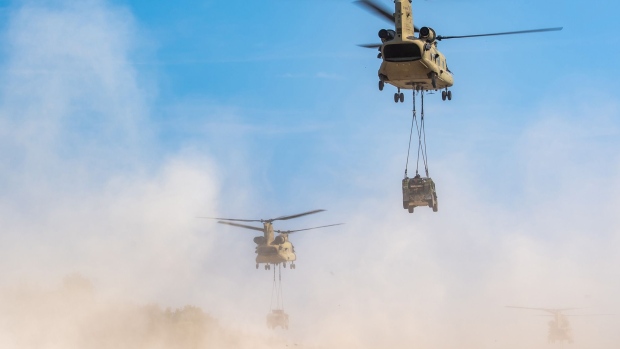Apr 20, 2021
U.K. Reaches $2 Billion Deal to Buy Boeing’s Chinook Helicopters
, Bloomberg News

(Bloomberg) -- The U.K. and the Pentagon reached agreement on a $2 billion sale of 14 Chinook helicopters built by Boeing Co., as well as engines, machine guns, radar and missile-jamming equipment for the choppers, according to officials and documents.
The agreement was confirmed in a previously undisclosed March 25 letter from the U.K.’s embassy in Washington that paves the way for signed contracts. But the letter also indicates that the U.K. wants to delay delivery of the helicopters by as much as three years, in part due to impacts from the Covid-19 pandemic.
The letter serves as “acknowledgment that the UKG wishes to extend its Chinook Vertical Heavy Lift capability by proceeding with the acquisition of quantity fourteen (14) new build Chinook H-47(ER) helicopters,” according to the text, referring to the U.K. government. “However, as a direct result of the worldwide impact of Covid-19, the UKG has had to reconsider the expenditure profile of this project.”
Even with a delay, the move is a boost to Chicago-based Boeing, which has been seeking to line up new customers for Chinooks built at its plant outside Philadelphia to help guard against a potential closing of the facility after the U.S. Army sought to scale back its orders.
Then-Army Secretary Ryan McCarthy personally pressed for the U.K. sale and another for 10 choppers to the United Arab Emirates during the Trump administration. Boeing remains in discussion with the UAE over a potential sale, according to a company official who asked not to be identified as talks continue.
Earlier: U.S. Wanting to Buy Fewer Chinooks Sees U.K., U.A.E. Buying More
In its letter, the U.K. said it wanted to minimize any negative price impact from the delayed deliveries.
“Work is at an advanced stage to commence the procurement of a number of new Chinook helicopters to replace older airframes in the fleet,” a spokeswoman for the U.K. embassy in Washington said in an email. “The delivery schedule and exact costs for the new Chinook helicopters are to be confirmed, but it is expected delivery will be completed before the end of 2030.”
The U.K. is “eager to proactively engage to understand and attempt to mitigate the price and schedule impacts of the three-year deferral while recognizing there are many programmatic and industrial base factors which need to be considered, some of which are outside of the scope of this Letter of Offer and Acceptance,” according to the letter.
In a statement, Boeing said it “has a strong relationship” with the Royal Air Force, and “we look forward to building on that partnership as the H-47 Chinook Extended Range procurement process continues.”
The U.K. took delivery of its first Chinook in November 1980. Boeing maintains the U.K.’s existing fleet of 60 older Chinook helicopters, “work that supports more than 450 highly-skilled jobs across the U.K.,” Boeing said in its statement.
In the U.S., potential sales agreements with the U.K. and U.A.E. were seen as key to gaining congressional support for an Army budget proposal -- two years in a row -- curtailing purchases of the latest Chinook model because the Army already has a surplus.
Cost Savings
The Army’s five-year budget plan called for saving $962 million from fiscal 2021 through fiscal 2024 by cutting 28 of 68 previously planned Chinooks, shifting much of the money into two new reconnaissance and transport helicopter programs.
Both House and Senate appropriations panels rejected that approach in their 2020 and 2021 spending measures, directing the Army to buy five more of the choppers this year. That came after bipartisan lobbying by lawmakers from Pennsylvania, where the helicopter is built, and New Jersey and Delaware, where many workers live.
Army officials are mulling for a third consecutive year whether to propose the truncation again in the fiscal 2022 budget, an official said.
Boeing needs to build 18 helicopters per year to keep the supply chain and skill sets intact, said Loren Thompson, chief operating officer of the Lexington Institute in Arlington, Virginia, citing company data. Boeing’s internal projections “indicate production levels below sustainable beginning in 2023” and “at that point previously booked foreign sales and Army work will be trailing off,” he added.
©2021 Bloomberg L.P.








